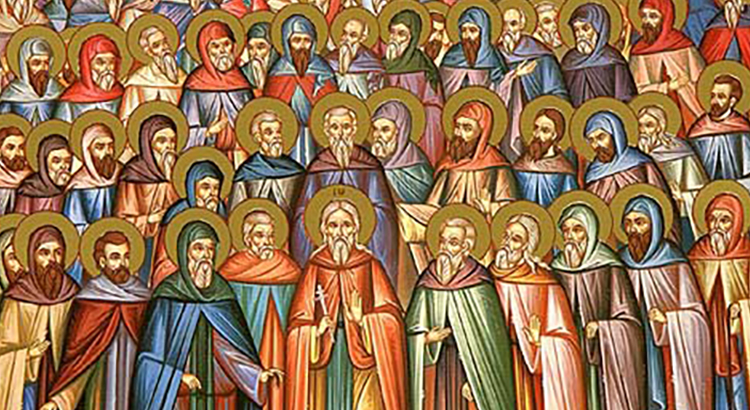Memory of the Saints and the Prophets
Reading of the Word of God
Alleluia, alleluia, alleluia
You are a chosen race,
a royal priesthood, a holy nation,
a people acquired by God
to proclaim his marvellous works.
Alleluia, alleluia, alleluia
Acts 17,15.22-18,1
Paul's escort took him as far as Athens, and went back with instructions for Silas and Timothy to rejoin Paul as soon as they could. So Paul stood before the whole council of the Areopagus and made this speech: 'Men of Athens, I have seen for myself how extremely scrupulous you are in all religious matters, because, as I strolled round looking at your sacred monuments, I noticed among other things an altar inscribed: To An Unknown God. In fact, the unknown God you revere is the one I proclaim to you. 'Since the God who made the world and everything in it is himself Lord of heaven and earth, he does not make his home in shrines made by human hands. Nor is he in need of anything, that he should be served by human hands; on the contrary, it is he who gives everything -- including life and breath -- to everyone. From one single principle he not only created the whole human race so that they could occupy the entire earth, but he decreed the times and limits of their habitation. And he did this so that they might seek the deity and, by feeling their way towards him, succeed in finding him; and indeed he is not far from any of us, since it is in him that we live, and move, and exist, as indeed some of your own writers have said: We are all his children. 'Since we are the children of God, we have no excuse for thinking that the deity looks like anything in gold, silver or stone that has been carved and designed by a man. 'But now, overlooking the times of ignorance, God is telling everyone everywhere that they must repent, because he has fixed a day when the whole world will be judged in uprightness by a man he has appointed. And God has publicly proved this by raising him from the dead.' At this mention of rising from the dead, some of them burst out laughing; others said, 'We would like to hear you talk about this another time.' After that Paul left them, but there were some who attached themselves to him and became believers, among them Dionysius the Aeropagite and a woman called Damaris, and others besides. After this Paul left Athens and went to Corinth,
Alleluia, alleluia, alleluia
You will be holy,
because I am holy, thus says the Lord.
Alleluia, alleluia, alleluia
In Luke's narration, after Jerusalem and before Rome, Athens appears as a strategic city for the proclamation of the Gospel. It was the cultural capital of the time. However, once arrived in the city, Paul did not begin challenging the Athenian intellectuals immediately. He wanted to understand the culture, the customs, the feelings, and the life of the inhabitants of the city. Luke's remark portraying him as an ordinary tourist walking through the streets of the city, curious to know and see, is singular. We can imagine the thoughts that went through Paul's mind. His problem was clear: could Jerusalem (the Gospel of Jesus) conquer Athens? It is the same question that we continue to ask ourselves today in the face of the many areopaguses of this world, in the face of the many cultures that inhabit the planet and that inhabit the hearts and minds of men and women. The boldness of Paul, who courageously stood before the wise people of Athens, shows us that no culture is foreign to the Gospel. Indeed, today's Areopagus are waiting for disciples who know how to proclaim with wisdom and strength the salvation that comes from Jesus. Paul's discourse juxtaposes properly biblical themes with motifs closer to Greek philosophy. His intention is to bring the two cultures into dialogue so that the Gospel can ferment Greek culture. His call to the altar of the "unknown God" is a well-thought beginning. Paul wisely introduces us to how to communicate the Gospel so that people of other cultures can also understand it and thus allow it to act in their hearts and in society. He could not, however, remain silent on the crucial theme of the resurrection: it is the meaning of life, the destination of human history and creation, the Beyond of the Gospel. Those Athenians who also believed in the immortality of the soul could not accept that the "flesh" - the "ashes" that we are, was so loved by God that it received from Him the full breath of the resurrection.
